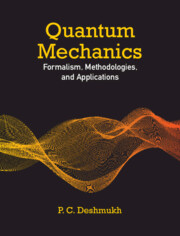Book contents
- Frontmatter
- Dedication
- Contents
- List of Figures
- Foreword
- Preface
- 1 Description of a Physical System
- 2 Path Integral Formulation of Quantum Mechanics
- 3 Probability Tangles and Eigenstates of One-dimensional Potentials
- 4 Angular Momentum
- 5 The Non-relativistic Hydrogen Atom
- 6 Approximation Methods
- 7 The Relativistic Hydrogen Atom
- 8 Quantum Mechanics of Spectral Transitions
- 9 The Many-Electron Atom
- 10 Quantum Collisions
- 11 Introduction to Quantum Information and Quantum Computing
- Appendix A Symmetry of the Hamiltonian
- Appendix B Schrödinger, Heisenberg, and Dirac “Pictures” of Quantum Dynamics
- Appendix C Spherical Harmonics
- Appendix D Occupation Number Formalism Second Quantization
- Appendix E Electron Structure Studies with Qubits
- Index
Preface
Published online by Cambridge University Press: 14 September 2023
- Frontmatter
- Dedication
- Contents
- List of Figures
- Foreword
- Preface
- 1 Description of a Physical System
- 2 Path Integral Formulation of Quantum Mechanics
- 3 Probability Tangles and Eigenstates of One-dimensional Potentials
- 4 Angular Momentum
- 5 The Non-relativistic Hydrogen Atom
- 6 Approximation Methods
- 7 The Relativistic Hydrogen Atom
- 8 Quantum Mechanics of Spectral Transitions
- 9 The Many-Electron Atom
- 10 Quantum Collisions
- 11 Introduction to Quantum Information and Quantum Computing
- Appendix A Symmetry of the Hamiltonian
- Appendix B Schrödinger, Heisenberg, and Dirac “Pictures” of Quantum Dynamics
- Appendix C Spherical Harmonics
- Appendix D Occupation Number Formalism Second Quantization
- Appendix E Electron Structure Studies with Qubits
- Index
Summary
A graduate course on quantum mechanics is a daunting task – for both students and teachers. Students come for such a course with a fair amount of background in classical physics, classical in the sense that it is time-tested. They are familiar with the works of Newton, Lagrange, Hamilton, Euler, etc. In this scheme, an object's physical state is described by its position q and momentum p, and temporal evolution by Hamilton's equations of motion for the time rates and. Their experience with classical physics entrenches their faith in it and builds their intuition, but they must now be taught that a physical theory that requires simultaneous knowledge of position and momentum is fundamentally untenable. Students must now settle with the fact that classical mechanics ‘works’ only when it is a very good approximation to a more appropriate theory of Nature, which is quantum mechanics. The foundational principles of quantum mechanics conflict with those of classical physics, causing confusion and doubt. Overcoming the resulting befuddlement involves learning what seems like an abstract formalism, which nonetheless turned out to be an unassailable theory of practical value. It changed our lives in the last century with quantum devices, and is now all set to take another leap into the second quantum revolution. It ushers in mind-blowing technology driven by entanglement and quantum computing.
The route to diligent applications of quantum mechanics begins with a shock. Students must grapple with formidable challenges on the path to comprehending consequential principles in a mystified territory. They have to develop proficiency in new methodologies involving abstract mathematics before they can see for themselves that quantum theory simply works; nothing succeeds like success. They can then use the theory to propel the frontiers of sciences, engineering, and technology. Amid this bewilderment, a graduate course in quantum mechanics is as romantic as it is challenging. One must learn to see beyond the corners of your vision, acquire rigorous capabilities in mathematics, enjoy luminous discourses between brilliant minds, cultivate an inventiveness to develop new technology that impacts human life, and understand the cosmos. Quantum mechanics: formalism, methodologies, and applications is a vast subject, very young compared to classical physics, but a very rich field to which some of the most outstanding intellectuals have made dazzling contributions during the past hundred odd years.
- Type
- Chapter
- Information
- Quantum MechanicsFormalism, Methodologies, and Applications, pp. xxv - xxviiiPublisher: Cambridge University PressPrint publication year: 2024



